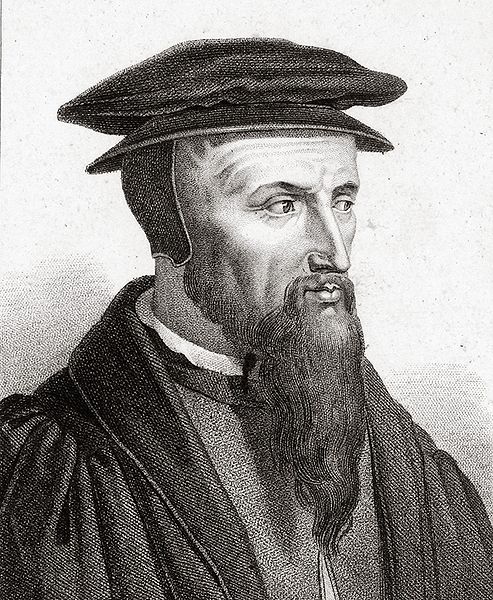
TABLE OF CONTENTS
I. Introduction
II. Summary of Catholic (and Arminian) Critique
III. Supralapsarianism: Definition
IV. Double and Single Predestination: Definitions and Calvin’s View
V. Supralapsarianism and Positive Reprobation in Calvin (Including Opinions of Several Reformed and Other Protestant Scholars)
VI. Secondary Cause
VII. The Catholic Solution
VIII. God as the Author of Evil in Supralapsarian Calvinism
IX. St. Thomas Aquinas and Predestination
X. Molinism: An Explanatory Slight Digression
I. Introduction
John Calvin wrote:
. . . whence does it happen that Adam’s fall irremediably involved so many peoples, together with their infant offspring, in eternal death unless because it so pleased God? . . . The decree is dreadful indeed, I confess. Yet no one can deny that God foreknew what end man was to have before he created him, and consequently foreknew because HE SO ORDAINED BY HIS DECREE . . . God not only foresaw the fall of the first man, and in him the ruin of his descendants, but also METED IT OUT IN ACCORDANCE WITH HIS OWN DECISION.
(Institutes of the Christian Religion, III, 23, 7, McNeill / Battles edition, Philadelphia: Westminster Press, 1960, Vol. 2, 955-956)
It is held by many Calvinist scholars that at least some elements of Calvin’s teachings suggest supralapsarianism (i.e., the belief that God predestined the Fall itself), though the majority of his followers must be classified as infralapsarians. Calvin’s own thought, it should be noted, recognizes paradox and mystery, and is not expressed in the more technical, philosophical, “scholastic” terminology which has characterized many Calvinists in the next generation after Calvin and thereafter.
God — in the supralapsarian view — would appear to be the author of sin and of evil, since He decreed it from eternity. Luther and Zwingli also held similar views. But God need not be the author and cause of sin. Neither omnipotence nor the doctrine of creation require it. And God’s omnibenevolence precludes it.
The Oxford Dictionary of the Christian Church states:
According to him [Calvin], before the Fall and even before creation, God, in his eternal counsels, predestined some of His creatures to salvation and others to damnation. This entails that God wills not only the reprobation of the damned but also the sin which leads to it, as he who wills the end must will the means. This doctrine was later, however, rejected by the more moderate Calvinists.
(edited by F. L. Cross, Oxford Univ. Press, revised edition, 1983, 224, “Calvinism”)
Alister McGrath, who published a biography of Calvin in 1990, writes:
Predestination, for Augustine, refers only to the divine decision to redeem, not to the act of abandoning the remainder of fallen humanity.
For Calvin, logical rigour demands that God actively chooses to redeem or to damn. God cannot be thought of as doing something by default: he is active and sovereign in his actions. Therefore God actively wills the salvation of those who will be saved and the damnation of those who will not.
(Reformation Thought, 2nd edition., Grand Rapids, Michigan: Baker Book House, 1993, 125)
Salvation thus lies outside the control of the individual, who is powerless to alter the situation.
(Ibid., 127)
Likewise, his description of Zwingli’s belief seems to me to illustrate that he held to essentially the same idea:
Whether an individual is saved or condemned is totally a matter for God, who freely makes his decision from eternity.
(Ibid., 121)
How is this not an “efficient source” of evil, seeing that God “actively wills” the damnation of the reprobate (assuming McGrath’s correctness in his summary), and also seeing that — this being the case — the actuality of events cannot be otherwise?
My critique is not that Calvinism isn’t logical or consistent; rather, that it is consistent to the detriment of God’s goodness (especially in its supralapsarian variety). Its logic flows — unfortunately — consistently from its premises, by and large. It is primarily an issue of God’s goodness and justice.
I deny the premises of Calvinism, and indeed I reject all five points of TULIP (although “U” and “I” are somewhat close calls, and I believe the Thomistic position would approximate those). Calvinists attempt to apply nuances and qualifications to this matter, but the fact remains that the “condemned” are utterly powerless to act or choose otherwise. The end result is the same, however God brings it about by His alleged decree to reprobation. It is the end result which is reprehensible, given Calvinist premises, not the means, whatever they are. Hell, it seems to me, can only be consistent with God’s all-loving, all-merciful character if it is a place / condition / state which creatures freely choose of their own volition.
I say double predestination is unjust because it doesn’t apply to all men equally. The only reply to that seems to always be (from my reading Luther and Calvin, and talking to Calvinists): “who are YOU to judge what God does or doesn’t do?” To which I would reply: “Who are YOU to turn God into a capricious, unjust tyrant?” God cannot be in conflict with the laws of morality which He has revealed to us. God is love.













